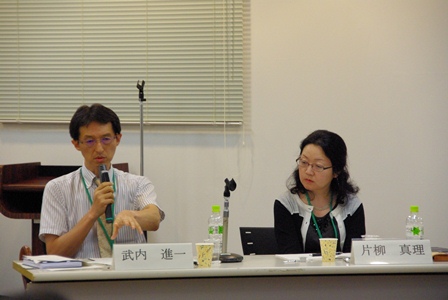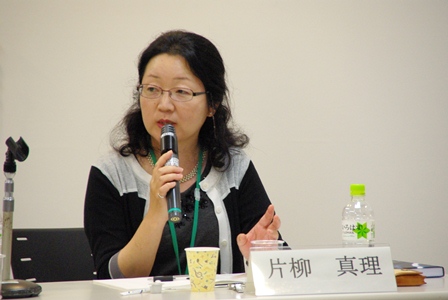JICA-RI Holds a Book Launch for Confronting Land and Property Problems for Peace
2014.09.19
On September 1, JICA-RI held a public seminar for a presentation of a book entitled Confronting Land and Property Problems for Peace , which is a product of JICA-RI’s research project.
The book is the outcome of the research project “Land and Property Problems in Post-conflict State-building and Economic Development” conducted between 2011 and 2013. It discusses problems of land and property in conflict- affected settings.

Dr.Takeuchi giving a presentation
Dr. Shinichi Takeuchi, the Deputy Director General of the Area Studies Center of the Institute of Developing Economies, Japan External Trade Organization (IDE-JETRO) (former JICA-RI Visiting Fellow) who is the editor and a contributor to the book, and Dr. Mari Katayanagi, Associate Professor at the Graduate School for International Development and Cooperation, Hiroshima University (former JICA-RI Senior Research Fellow) who is also a contributor to the book, gave presentations at the seminar. Dr. Jin Sato, Professor at the Institute for Advanced Studies on Asia, the University of Tokyo (former JICA-RI Visiting Fellow) and Mr. Naoshi Sato, JICA Senior Advisor, participated in the seminar as commentators. JICA-RI Executive Senior Research Fellow Atsushi Hanatani and JICA-RI Research Fellow Sachiko Goto Kamidohzono also attended the seminar.
Firstly, Dr. Takeuchi pointed out that in order to realize reconstruction and peace in conflict-affected countries, problems related to people’s everyday life need to be looked at and that land and property problems are among such problems. He then asserted that a long-term perspective with an understanding of the political and social context of the country is critical as these problems are highly depending on the state-society relationship. Dr. Takeuchi presented the cases from Rwanda and Burundi, which have similar social structures but different political systems. The political interventions in land problems in those countries yield very different results due to the variation in the governing abilities of the states. He then suggested that the relevance to overall governance reforms should be considered when assistance to solving land and property problems is provided.
Secondly, Dr. Katayanagi gave a presentation on property rights in the state-building of Bosnia and Herzegovina. A major intervention by the international community facilitated successful property restitution, however, problems concerning state properties remain unsolved due to the lack of appropriate farmland policies in this case. Katayanagi pointed out the tenuous relationship between the state and the people concerning property rights as the main factor behind these problems. Dr. Katayanagi emphasized, as a policy recommendation from the research findings, that not only humanitarian agencies but also development agencies should be involved in land and property problems from the early stages of the post-conflict period by considering the land governance systems and political context that are specific to each country and/or region.

Dr.Katayanagi giving a presentation
As a commentator, Dr. Jin Sato appreciated the book as an effort to shed light on land and property problems, important and fundamental but overlooked issues, in relation to development aid. He then raised the following three discussion points: 1) Leaving ambiguity in land ownership may be one strategy to avoid the aggravation of conflicts over land in post-conflict settings; 2) The strengthening of society’s capacity also needs to be considered as the enhancement of the state’s conflict mediation capacity may hamper people’s problem solving abilities and; 3) conflict could also be an opportunity for positive change, and it might be rather unusual that land was redistributed without conflicts.
Following Dr. Jin Sato’s comments, Mr. Naoshi Sato, having touched upon the importance and difficulties of the establishment of rules and regulations for solving land and property problems and assistance to legal and judicial systems for peacebuilding, emphasized the significance of civil society empowerment through increasing people’s participation in legal issues in addition to building formal institutions and systems. Further, he pointed out that the appropriate development and application of rules for solving land and property problems will be an important means of empowering civil society, because citizens are highly interested in these issues as they are closely related to people’s everyday life.
The comments led to active discussions with the floor. Questions raised by the audience included how to ensure the appropriate implementation of land-related policies by governments while they tend to be politicized and how to address the contradiction between the strategy to leave ambiguity in land ownership such as respecting local customary law, and the introduction of foreign direct investment which is often encouraged by government in post-conflict settings.

事業事前評価表(地球規模課題対応国際科学技術協力(SATREPS)).国際協力機構 地球環境部 . 防災第一チーム. 1.案件名.国 名: フィリピン共和国.

事業事前評価表(地球規模課題対応国際科学技術協力(SATREPS)).国際協力機構 地球環境部 . 防災第一チーム. 1.案件名.国 名: フィリピン共和国.

事業事前評価表(地球規模課題対応国際科学技術協力(SATREPS)).国際協力機構 地球環境部 . 防災第一チーム. 1.案件名.国 名: フィリピン共和国.

事業事前評価表(地球規模課題対応国際科学技術協力(SATREPS)).国際協力機構 地球環境部 . 防災第一チーム. 1.案件名.国 名: フィリピン共和国.

事業事前評価表(地球規模課題対応国際科学技術協力(SATREPS)).国際協力機構 地球環境部 . 防災第一チーム. 1.案件名.国 名: フィリピン共和国.
scroll